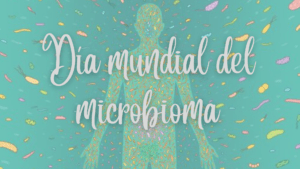
Hoy, 27 de junio se celebra el Día Mundial del Microbioma.
La microbiota intestinal es el conjunto de microorganismos que habitan en nuestro intestino y el microbioma el conjunto de genes que lo componen. Se estima que el microbioma presenta 150 genes más que el genoma humano.
El 27 de junio de 2018 se celebró el primer día mundial del microbioma con el fin de concienciar acerca de la contribución de los microbios y bacterias como alternativa innovadora para alcanzar un futuro sostenible. Desde entonces, cada año se pone en valor alguna de las cualidades o temas de interés sobre la microbiota intestinal.
Hacemos un pequeño recorrido por esta breve historia de la microbiota de la que queda aún mucho por descubir:
- 2019: Resistencia a los antibióticos. El objetivo era concienciar el uso inadecuado de los antibióticos. Una de las principales amenazas para la microbiota y la salud en general.
- 2020: Diversidad. El objetivo era concienciar sobre la importancia de mantener una estilo de vida que permita mantener una microbiota rica en diversidad para evitar numerosas enfermedades.
- 2021: Sostenibilidad. El objetivo era destacar la importancia de la microbiota en la consolidación de un futuro sostenible
- 2022: Microbiomas para la vida bajo el hashtag #Microbiomas4life
La microbiota representa un papel fundamental en el mantenimiento de la salud humana. Presenta numerosas funciones vitales para nuestro organismo.
Te comentamos las más importantes por las que se consideró que la microbiota debería tener un Día Mundial.
- Es única para cada individuo, como una huella dactilar.
Factores como el estrés, el medio ambiente o la alimentación varían la composición de la microbiota intestinal haciendo que cada persona, dependiendo de su estilo de vida, tendrá unas poblaciones más desarrolladas que otras.
- Está estrechamente ligada con el Sistema Inmunológico.
Aproximadamente el 80% de nuestro sistema inmunológico se encuentra en nuestro intestino. La microbiota está en estrecha comunicación con el sistema inmunológico respondiendo frente a diversas situaciones de peligro ayudando a la secreciones de citoquinas pro y antiinflamatorias.
- Eje intestino-cerebro-microbiota
La microbiota se encuentra estrechamente relacionada con el sistema nervioso central.
Este eje se establece durante las primeras horas de vida y condiciona la respuesta funcional de nuestro celebro.
Se ha comprobado que las emociones repercuten de manera directa en la microbiota de la misma manera que un desequilibrio emocional está implicado en procesos emocionales como el estrés, la ansiedad o la depresión.
- Sin la microbiota intestinal, no sobreviviríamos.
Como hemos comentado al principio del post, la microbiota representa un papel fundamental en el mantenimiento de la salud humana.
Gracias a la fuerte comunicación que presenta la microbiota con el sistema inmunológico, endocrino, nervioso y con los procesos homeostáticos, cada vez que enfermemos o estamos frente a situaciones de estés es capaz de responder activando los procesos necesarios para mantener nuestra salud y recuperarnos lo antes posible.
- Es un reflejo de tu yo interior
La microbiota va cambiando con nosotros a lo largo de los años.
Cuando nacemos, la microbiota se va definiendo según el tipo de leche con la que nos alimentamos y se consolida a los 3 años aproximadamente.
A medida que van pasando los años y atravesamos distintas etapas la microbiota cambia dependiendo de los hábitos alimenticios y hormonas hasta que, en la edad adulta, se estabiliza y presentamos la mayor diversidad.
Esta microbiota hay que cuidarla día a día llevando un estilo de vida saludable ya que es la que tendremos durante el resto de nuestra vida.